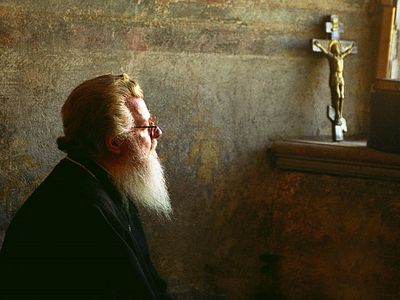Bob woke up one morning and felt terrible. He had no energy and his head hurt. After a while, he decided to go to see his doctor. When he got there the doctor had a number of questions for him:
“Are you eating good meals? A balanced diet?”
Bob replied, “Yes.”
“Are you getting enough exercise?” the doctor continued.
“Yes,” Bob said.
“Do you smoke?”
“No.”
“Then, I think you’re well,” the doctor said.
“But, doctor. My head is hurting and I have no energy,” Bob complained.
“You should cheer up,” said the doctor. “According to your answers, I think you’re doing what you should do. Keep it up.”
Bob is disappointed. He knew the doctor was right. He had done all the things he was supposed to do, but still he felt lousy. Maybe he just didn’t appreciate how well he was actually doing. He needed to learn to trust his doctor more.
+++
Of course this is fiction – but it is fiction based on how many Christians think of their spiritual lives. Christ is the physician of our souls. The Church, the Fathers say, is a hospital for sinners. So why do we think like Bob and his doctor? Why do we think that who we are and how we are doing can be described by how well we adhere to rules?
“Bob feels terrible.” That is a simple description that says something is wrong. What is wrong might not be reflected in any knowledge or practice of the rules. And there is by no means a direct correlation between the rules of the spiritual life and the actual condition of our spiritual lives. When we go to the doctor, what we expect is for him/her to diagnose what is actually going on. The rules of healthy living are only germane inasmuch as they relate to the diagnosis. If my symptoms point to problems with my liver, then the doctor is obviously going to ask about my consumption of alcohol. That question is not a moral question (though many patients answer such questions with morality-driven answers, making the diagnosis that much more difficult).
The Christian life is not a “moral” life when understood in this manner. Its purpose is not, on the deepest level, concerned with how well we have or have not kept the rules. The commandments of God are not arbitrary: they reflect God’s concern for our well-being. What is described as “sin” is the consequence, not of God’s punishment, nor a moral calculation regarding the commandments. Sin is the disease of death and corruption that works in us when we live in a manner that breaks our living communion with God, the Lord and Giver of Life.
This is not meant to trash or discard the term “moral.” Rather, my intention is to reveal its proper meaning. When someone says in confession, “I have neglected my prayers,” this itself is not a “sin.” Sin is something deeper at work within the soul that manifests itself with such neglect. If you read through a classic treatise such as the Ladder of Divine Ascent, you will not find a chapter on “neglecting prayers.” There are, however, chapters on sloth and carelessness and the like. And those chapters, much like a medical treatise, seek to understand the nature and the origin of the disease we call sin. Likewise, it is concerned with its treatment.
If I come into my doctor’s office and say, “I feel terrible, my head hurts and I have no energy.” It will be of no use whatsoever to be told, “Try not to do that anymore.” Lecturing a patient about his symptoms as though they were a moral problem is simple malpractice. In many ways, the same is true with regard to the manifestation of sin in our lives.
Morality, as popularly understood (or misunderstood), is seen as a simple misuse of the will. “There is a commandment. I broke it. I must have chosen to do so.” The cure must then be to choose to keep the commandment. Repentance must therefore be seen as a promise to try harder and choose better. But this is a useless caricature of our inner life. St. Paul in the seventh chapter of Romans writes with great anguish about the experience of doing what he didn’t want to do:
For what I am doing, I do not understand. For what I want to do, I don’t do; but what I hate, that I do…. Therefore, it is no longer I who do it, but sin that dwells in me…. O wretched man that I am! Who will deliver me from this body of death? (Rom 7:15, 17, 24).
Morality, rightly understood, is the spiritual science of the nature and working of sin and righteousness within the inner life of human beings. Rules alone are, at best, diagnostic tools. Wisdom and discernment, rooted in spiritual experience and the tradition of the Church are required to understand and interpret what is actually taking place within the soul and the proper path to its healing. And, most importantly, that path is rarely one of simply making better choices and trying harder. Sometimes, as St. Paul admits, the more we try the worse the problem becomes.
I have offered strong criticisms of “morality” in the past, and been taken to task by others who meant well. But the abuse of “morality” in a culture that is utterly convinced that the core of human existence is defined by the will and the choices we make has made it necessary to state in the clearest possible terms that such “morality” is false, misleading, and even positively harmful, inasmuch as it keeps us from properly understanding the nature of our condition and seeking proper care from the Physician of Our Souls. Orthodoxy might be “synergistic,” but we do not believe that our healing comes as a result of our choice or effort. Our “choice,” is to turn to God.
In a false morality of will and choice, success is measured by the keeping of the rules. But St. Paul acknowledges that regarding the Law (the rules), he was “blameless” (Philippians 3:6). But with such blamelessness his soul was darkened to the point that he persecuted the Church. He said that he later considered such blamelessness to be absolutely useless.
The false measure of “moral success” can make very little sense of how useful, evenessential, our weakness can be. Moral failure is, paradoxically, sometimes the most useful thing in the spiritual life. It is not unusual in our physical lives to be sick, but not sick enoughto get well. We trudge along in mild misery, thinking to ourselves that what is happening is not worth going to the doctor. Alcoholics, for example, begin their road to recovery by admitting that “their lives had become unmanageable.” But for many, their lives are just manageable enough to get by. And they manage just well enough to lose their souls. Failure can be among the greatest gifts of the spiritual life.
We are sick and we are all much sicker than we think. We need a diagnosis and a willingness to submit ourselves to the cure. We need a doctor for our souls, not a lawyer for our morality. As Christians, we need to recover the true morality of the Church and forsake the moralistic legalism that has been set in its place.
I place my hope in Your boundless mercy and approach You:
Receive me, O Christ, Lover of mankind, as You received the harlot and the thief, the publican and the prodigal son. Remove the heavy burden of my sins, for You take away the sin of the world and heal man’s weaknesses; You call the weary and over-burdened, giving them rest.
From the Prayers in Preparation for Holy Communion




